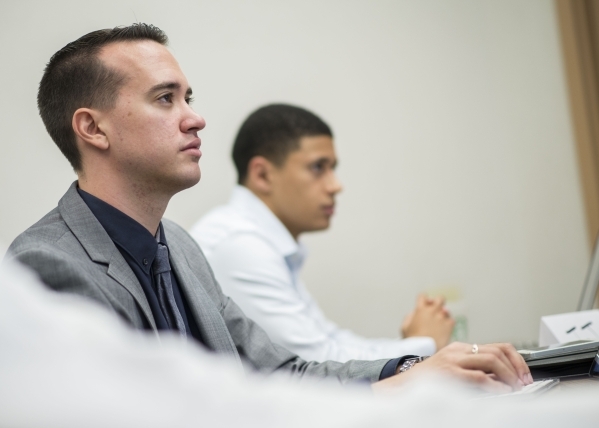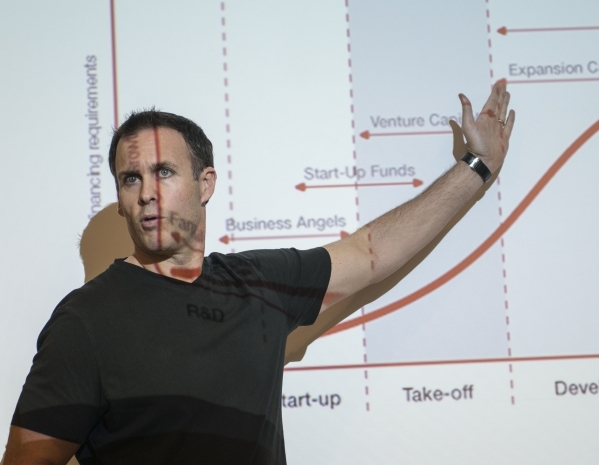

Students at the University of Nevada, Las Vegas’ Lee Business School learn about angel investing and venture capital from their professors and through textbooks, however, a group of them are looking outside the classroom to get hands-on experience.
They’re making the investment decisions for a student-run venture fund.
The Rebel Venture Fund launched in 2012 with help from Jeff Moskow, who donated $500,000 for students to make investments in small businesses and startups throughout Southern Nevada. Moskow, former ADT Security Services Inc. general manager, had been an adjunct professor.
“They learn about venture capital, startups, angel investing, the legal work behind the scenes, what it takes to do due diligence on a company, as well as professionalism, critical thinking and presentation skills,” said Andrew Hardin, associate dean for Research and director of UNLV’s Center for Entrepreneurship. “It provides so many opportunities for them to become more professional and augment their business degrees.”
In addition to providing a learning experience for students, Hardin said, Rebel Venture Fund, which boasts 21 members, offers a source of seed funding for small businesses and helps promote businesses in Southern Nevada.
According to Hardin, if a business is seeking funding through the Rebel Venture Fund, the application process starts with Gust, a website that connects startups with investors across the globe. The Rebel Venture Fund then checks for a local base, how much they’ve requested and if they have any connections to UNLV.
Once they pass the initial due diligence, students present their recommendations to the management and advisory boards, which includes nine and 12 members, who vote yes or no as well as requests any additional data collection on the company. If the company is approved, legal documentation begins and they are funded.
“The (management and advisory boards) have expertise in certain areas and come in once a month or so for meetings and students present any new investments and recommendations for investments,” Hardin said. “The board asks questions, gives advice and asks for more information before voting on whether we should write the check.”
Hardin said the fund provides up to $100,000 and the terms are negotiated during the creation of the legal documentation. The fund receives stock in the company.
Since launching, the group has invested in Walls360, a removable wall graphic company, and JobHive, a human resources-based recruitment company.
Once investments are made, students monitor and report sales, revenue, profit, company leadership changes, new products and any issues that arise.
“They look at anything and everything that has to do with how the company is doing since we invested,” Hardin said. “It’s a major part of the learning process for sure.”
Roddrick Reed, a senior finance major who is a fund director, said as an entrepreneur who owned his own event planning company, he wanted to gain insight into what investors look for.
“I wanted to get a taste of what’s on the other side of the table,” he said. “It totally transformed what I knew and it’s given me a more realistic view of the business landscape — so much so that I changed my career focus to pursue private equity as opposed to running my own company.”
The fund’s biggest challenge, according to Reed, is the number of companies that submit business plans in hope of receiving an investment.
“Las Vegas is a relatively new hub for startup companies and though we don’t see as many companies as other cities do, we’re getting there,” he said. “We have a unique opportunity because we represent the university and dealing with students who are interested in the company is attractive because we’re able to think outside the box and we have different backgrounds and experience, which can be beneficial to companies.”
Khalon Richard, a senior finance and marketing major who serves as a fund director, said the fund has been the best activity she’s joined in college.
“It’s the single most beneficial extracurricular I’ve participated in because it’s equal parts learning and doing,” she said. “It adds value to a degree and it’s a great way to get experience. We need more organizations like this.”
According to Reed, though UNLV isn’t the only university with its own venture capital program, it’s rare to find one that is fully student run.
“Usually you’ll find one with a full-time delegate that does research and makes the final decision but we’re a part of the whole process from A to Z,” he said.
In the future, Richard said she hopes to read about the fund getting a return on its investment, which will be long after she graduates — in about five to eight years.
“It would be fun to read about and know I was a part of it,” she said.
Hardin said he’d like to see the fund’s bank account increase as well as the number of companies seeking an investment and the diversity among the fund’s members.
“We have a diverse fund right now but they’re not diverse in terms of majors so I’d like to see it more widely spread,” he said. “It’s great to see students go through and learn before they graduate and do great things. That’s why I’m in this job.”
For more information, visit http://entrepreneurship.unlv.edu/RVF.







